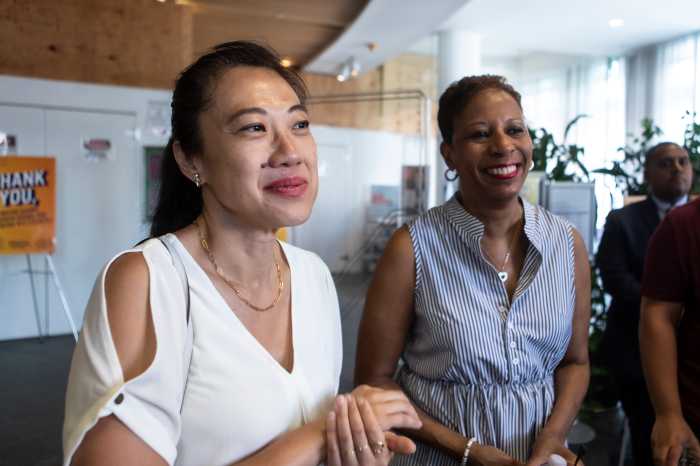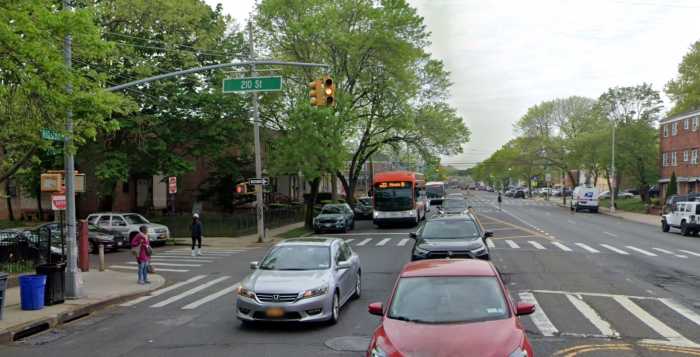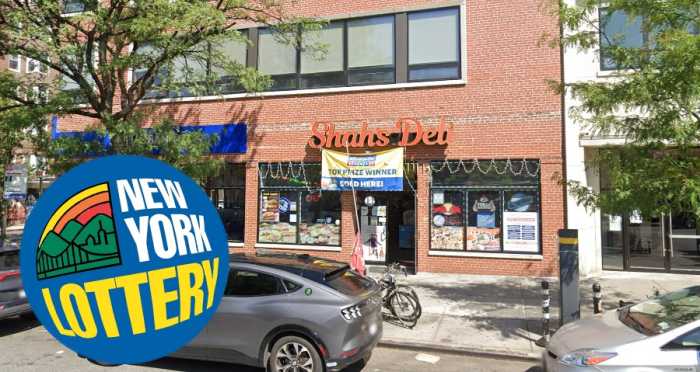By Gary Buiso
Community Board 7’s Land Use Committee last week voted unanimously to approve the conversion of a parking lot into affordable and supportive housing for the formerly homeless and mentally ill. The full board, which voted as this paper went to press Wednesday night, is expected to follow the lead of its committee and approve the $7 million project. The proposed five-story building, at 575 Fifth Avenue in South Park Slope, is being developed by the Fifth Avenue Committee (FAC), a local not-for-profit organization. Plans call for the construction of 49 units, all studio apartments. Twenty-nine of the apartments will be set aside for people leaving the city’s shelter system, with a diagnosis of mental illness, while the remaining 20 units will be reserved for low-income tenants. Michelle de la Uz, the executive director of FAC, said her organization would not discriminate against someone with a criminal record, but assured that the organization has a stake in the success of the project, and would not hesitate to evict a tenant that proves to be a bad neighbor. The building will have 24-hour security and a live-in superintendent. “We are not just the developer, we are the landlord,” de la Uz told the committee. For all the units, the maximum income a tenant may earn is $29,775. De la Uz told the committee that the building will not be a shelter. “It is leased-based housing. It is affordable housing with on-site social support,” she said. “This is not a clinic, hospital or treatment facility,” she said. “We help people live and work with dignity.” She predicted the building will become a part of the “fabric of the community, contributing to the quality of life of the neighborhood.” Once constructed, FAC will manage the property. The Center for Urban Community Services will provide social services once the building is opened. Staff members will help residents go to treatment programs or make doctors appointments, for example. Along 16th Street, the building changes in scale, dropping to four stories in height. There is also a 2,000-square-foot retail component to the project. “Good architecture can really make people’s lives better,” she said. “It really works,” architect Amie Gross said. Gross said the building would be one of the first environmentally friendly or ‘green’ buildings in the borough, saving considerable energy. There will be a lush garden too, she said. Construction may begin in the fall, and will span 18 months. The bulk of the financing for the project will come from the city, but there is a private equity component to the plan as well, according to FAC. The project is currently undergoing a public review, as the disposition of publicly-owned land, as well as the supported housing loan program which will help fund the project, requires it. The borough president hosted a hearing on the matter on Feb. 20, but did not vote on the project. The City Council and mayor must also approve if the plan is to proceed. Michael Halkias, the longtime owner of the Grand Prospect Hall on Prospect Avenue, said the project could ruin local businesses already affected by the scarcity of parking spaces. “That parking lot isn’t underutilized—it is being used to its fullest and is well appreciated by the local merchants and the people who live on 16th and 15th Streets,” he said. Halkias said he planned to present the community board this week with a petition showing that local businesses overwhelmingly reject the plan. “The parking lot is being usurped for a residential living facility,” he added. He said business might also be affected by the new neighbors. “How are merchants going to run their business with people with such disabilities running up and down the avenues?” he asked. “Will that enhance the merchants’ abilities to sell products?” The committee attached conditions to its vote, including that there be a preference given to tenants who are senior citizens and youth aging out of foster care. Also requested was that community representation on an advisory council include at least three residents of 16th Street, one from the community board and two from local businesses. At the committee’s hearing, held at St. John-St. Matthew Emmanuel Lutheran Church on Prospect Avenue, supporters of FAC—as well as its employees and those who live in other FAC-developed housing—were in abundance. Joe Levine, a resident of 16th Street, said the neighborhood has invested so much in its battles against crime and later, the rogue building developers, that this project should be welcomed. “It’s thoughtful, dignified and does a good job respecting its surroundings,” he said. Local resident Jonathan Rosen said neighbors should cheer a project that will make the area more “inclusive,” especially compared to a recent area trend: “shoddy luxury development that will push more people out.” Lucy Santiago, whose mentally ill brother resides in a FAC-developed building on Warren Street, said projects like 575 5th Avenue help restore dignity to people forced to society’s margins. “He used to live in a place where there were four people to a room, until the FAC offered him opportunity,” she said. “He’s been independent there [on Warren Street] and doing good,” Santiago continued. “We’ve been able to keep him from mental institutions.” Few speakers voiced their displeasure publicly, save for resident Patricia Arias. She said the people served by the project “are not able to contribute to the fabric of our diverse, family-oriented neighborhood.” She blasted the public outreach by FAC, saying it “acted covertly to conceal the project from residents.” “This is a fabricated meeting!” she said. “CB 7 must reject this project as ill-advised,” she said from the back of church. She said the future tenants would be “better served in a mental facility.” “We can’t afford to lose our parking,” Arias added. As he was leaving the hearing, longtime local resident Robert Gallo said he felt the project was “being rammed down our throats.” “There’s been no input,” he said. “There’s a one-sided thing going on here,” he said, referring to the large number of FAC employees and supporters at the meeting. “They have name tags and everything,” he said. City Councilmember Bill de Blasio, whose district includes the project, said that in general he supports the plan. “I’m not going to say I don’t have concerns,” he said, adding he was most concerned about “the process of screening people and security.” “We need to make sure that everyone and anyone gets their voice heard,” de Blasio said. The other issue is parking, he said, which will not be helped by the elimination of the municipal lot. “We fundamentally need more affordable housing…need to find ways to make the transition from shelter to housing,” the city lawmaker said. He said FAC must continue to answer questions and be accessible to the community. “The goals here are the right kind of goals,” he said. Committee chair John Burns urged FAC to be more “open and honest,” and faulted the organization for an outreach effort that he considered underwhelming. “This is a business decision,” he said of the project. “I don’t want people to think that the FAC is in it for pure altruism.” De la Uz said her organization has a 30-year-track record of helping low- and moderate-income Brooklynites. “We can lift people out of poverty,” she said. She said FAC met with the board’s Human Services Cabinet three times since the project was first discussed 18 months ago. Board chair Randy Peers said the Human Services Cabinet “is not the community board” but rather a group of social service organizations which periodically meet.



































